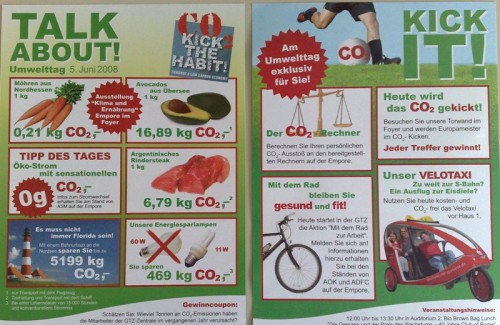So today is World Environment Day and I had actually planed not to cover this special day as I am dealing with environmental issues almost every day and would actually have to blog on it every day then. Just similar to what World Water Day means to me (not much as a *special occasion* from my very own pov, that is).
However, as I went for lunch with my colleagues today, we found the following flyer(s?) on our tables and I instantly thought: hey, i’ve gotta blog this. ..
.So, here you go:
And? What’s the message?
- Locally grown carrots produce less carbon dioxide emissions than avocados that were imported via airplanes.
- Argentinian beef steak has a (calculated) carbon emission of 6,79kg/kg if transported via ship.
- Energy saving / compact fluorescent lamps of 11W save an equivalent of 469kg of carbon emissions when compared to conventional bulbs @60W and a life expectancy of 15.000h.
- Take your bike to work and contribute to a better environment
(which would be ~ 12 km one way for me). - …and: calculate your own carbon footprint – which takes into account ALL data. Average carbon emission of Joe User in Germany (according to this site!) is around 10t/a, and I was just below it with ~ 8t/a. Still, lots of room for improvements. My colleague had ~ 25t/a! What’s yours?
Lesson learned: everything is interconnected, interwoven to a huge network of reasons and causes. Eating expensive and imported avocados from Kenya that cost at least 1,- EUR each and come at the size of an egg (sic!) are much more problematic than local food.
It prolly produces even more carbon emissions than the printing and distribution of such flyers to a staff / target group that is already sensitized for the world’s burning issues (health, water, sanitation, energy, transport, urbanisation, HIV, Malaria, war, greed, etc. etc.). …
No, seriously, World Environment Day is here to remind all of us that environmental protection starts with our own environmental awareness and that we can not just sit back and wait for some Messiah to come and give us a working solution. Rethink your actual behaviour and identify the potential.
(And this, although I am a strong defender of the Braungart/McDonough theory, e.g. how nice it would be to have a 2nd – green – industrial revolution where the reduction of *bad behaviour* isn’t a solution (= consuming less is still harmful), but instead identifying and using materials whose biological and technical nutrients remain in an loop. Ecosan is one of such approaches….but that’s another story :-).

